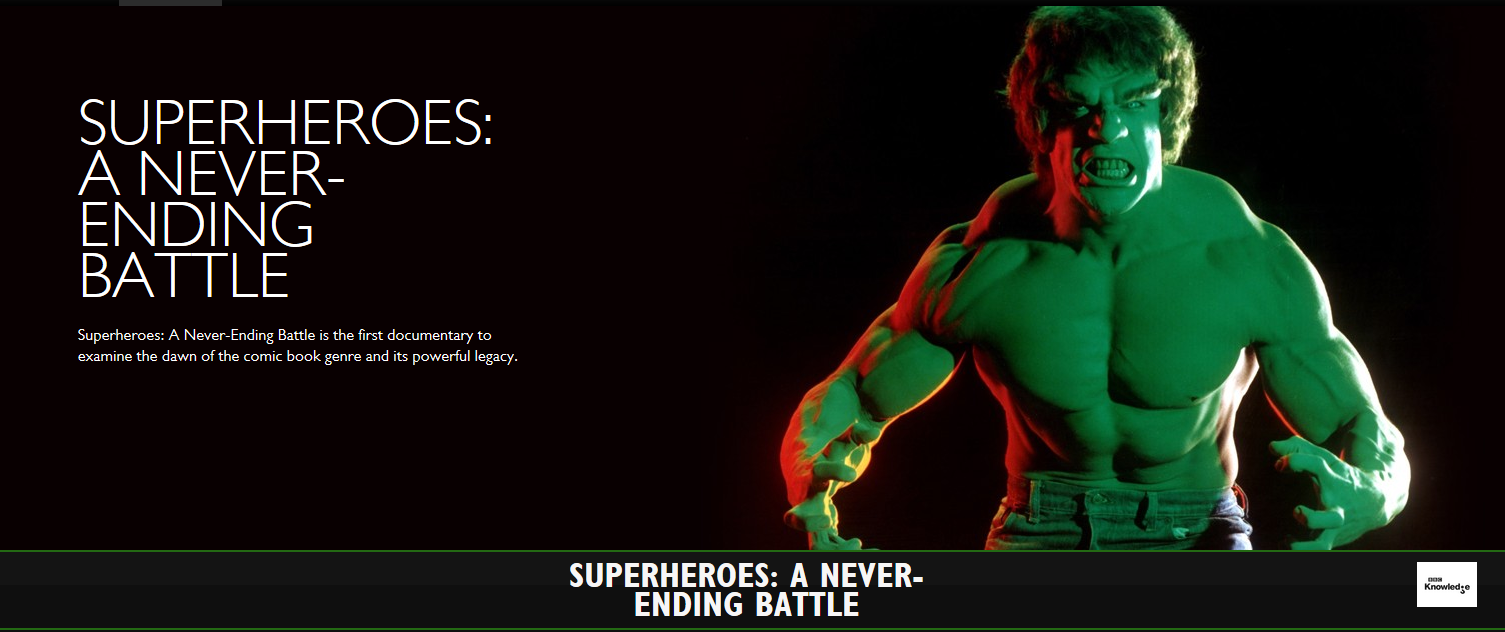Studio: Ghost Light Films
Writer: Michael Kantor and Laurence Maslon
Director: Michael Kantor
Executive Producers: Patty and Jay Baker

Superheroes: A Never-ending Battle Episode 1, Truth, Justice and the American Way, is a North American Public Broadcasting System (PBS) documentary recently aired on BBC Knowledge, focused on the birth of comic book superheroes and the near demise of those superhero comic books some fifteen years later. And Superheroes: A Never-ending Battle Episode 1, Truth, Justice and the American Way treats the subject matter as a case study of American society from the Great Depression of the late 1920s to the mid 1930s, to the age of rock and roll in the 1950s.
The program is packed with rare photographs and new interviews with the who’s-who of comic book artists and writers: Neal Adams, Jules Feiffer, Ramona Fradon, Bill Gaines, Carmine Infantino, Phil Jimenez, Jenette Kahn (former DC president), Joe Kubert, Grant Morrison, Trina Robbins, Jerry Robinson, Joe Simon, Jim Steranko and Mark Waid.
‘Superheroes are American gods,’ begins narrator actor Liam Schreiber, also known as Sabretooth from X-Men Origins: Wolverine. ‘It’s American; it’s sort of like jazz,’ states cultural icon, former Marvel Comics publisher, Stan Lee. “It’s an American art form.”
Superheroes: A Never-Ending Battle Episode 1, Truth Justice and the American Way suggests the roots of this ‘American art form’ were inextricably entwined with the U.S. immigrant experience and America’s failing economic system in the late 1920s. “Superheroes were first created by young men dreaming of an escape from the Great Depression,” suggests Schreiber. The creators, it would seem, were mostly young immigrant offspring, urban and male.
The first comic book mentioned by name in Superheroes: A Never-Ending Battle Episode 1, Truth Justice and the American Way, and rightly so, is Action Comics No. 1, June 1938, the initial appearance of the first superhero: Superman by Jerry Siegel and Joe Shuster, two Jewish teenagers from Cleveland, Ohio. ‘The elements that Siegel and Shuster adopted into this comic strip set the pace for virtually for all superheroes to come’, offers comic book writer and artist Jim Steranko.
Pulitzer Prize-winning author Michael Chabon notes in the documentary, that Superman is the ultimate immigrant, trying to fit in and adopting a gentile-sounding name. And Chabon does on to say, ‘That was a powerful expression of the American immigration experience’.
In Superheroes: A Never-Ending Battle Episode 1, Truth Justice and the American Way, a Golden Age comic book studio bullpen ‘looked like a high school classroom in the Bronx,’ states researcher Gerard Jones, ‘largely Jewish, lots of Italians, lots of Hungarians, a fair number of Irish. But for the most part it was the Jewish kids who seemed most to connect with this idea of the superhero.’ Captain America creator Joe Simon noted that most of his colleagues were sons of immigrants. Simon suggested DC Editor Whitney Ellsworth ‘was on as the company goy. They had to have a front who was not Jewish’.
Superheroes: A Never-Ending Battle Episode 1, Truth Justice and the American Way offers evidence most of the comic book publishers of the time were mostly East European Jewish immigrant and first-generation men living in New York City. Depression-era publishers ‘were really a pretty sleazy bunch,’ said Jones, ‘and some of them were unquestionably connected to the big mobs.’
Superheroes: A Never-Ending Battle Episode 1, Truth Justice and the American Way suggests superhero publishers cut their teeth on Depression-era pulp magazines, and their influence on the modern superhero cannot be overstated. The early comics looked like pulps, and were plotted like pulps, albeit for a younger audience. These pulp magazines provided the direct inspiration for the next great superhero to follow Superman, namely Batman in 1939. ‘Batman,’ suggests Steranko, ‘was the comics book version of the pulp character the Shadow.’
Superheroes: A Never-Ending Battle Episode 1, Truth Justice and the American Way points out after Superman and Batman appeared the superhero flood gates opened but comic book creators began to worry about far-flung relatives in Europe as the Nazis rose to power. Once again the common man needed a champion to fight powerful forces aligned against him. In this primordial soup emerged Captain America, not the first but the greatest patriotic star-spangled hero to appear from the creative minds of the team of Joe Simon and Jack Kirby.
However, as Superheroes: A Never-Ending Battle Episode 1, Truth Justice and the American Way evidences, after the war superhero comic books fell from being an important psychological outlet to becoming kindling for comic book-burning mobs. ‘Superheroes seemed to be less and less appealing after the war,’ suggests Chabon. The returning GIs wanted something different, something “a little more sophisticated.”
Superheroes: A Never-Ending Battle Episode 1, Truth Justice and the American Way considers a changed America had a lot to do with the demise of superhero comic books. And suggests winning The Second World War gave a tremendous boost to the U.S. psyche and economy, and the little man had, in fact, become the real hero. The Golden Age of superheroes seemed to be over. The proceeding explosion of more adult-themed comics in the early 1950s almost doomed the comic book industry due to a crusade to stamp out comic book depictions of violence, crime and horror. In Superheroes: A Never-Ending Battle Episode 1, Truth Justice and the American Way The McCarthy Era of the 1950s ushered in a new age of legislative morality on American society, and by the middle of the decade the Comic Book Industry created the Comics Code. The comic book superhero returned.
For the general public and comic book reader alike, Superheroes: A Never-Ending Battle Episode 1, Truth Justice and the American Way is the perfect place to start understanding the how and the way superhero comic books got to here. And the seemingly never-ending impact the genre continues to exert on American society and beyond.
Reviewer: Joe Lovece
Reviews Editor: Steve Hooker

